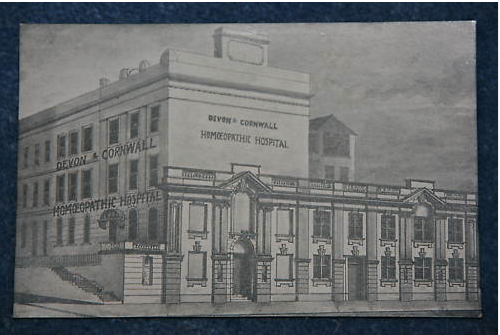The Plymouth, Devon and Cornwall Homeopathic Dispensary and Cottage Hospital
June 25, 2010
 The
Plymouth Homeopathic Dispensary and Cottage Hospital, Union Street,
Plymouth, opened in 1870, firstly as a homeopathic dispensary, but due
to the huge demand, this quickly developed into a Cottage Hospital.
The
Plymouth Homeopathic Dispensary and Cottage Hospital, Union Street,
Plymouth, opened in 1870, firstly as a homeopathic dispensary, but due
to the huge demand, this quickly developed into a Cottage Hospital.
The hospital continued to function until 1970,
1850 - William Morgan moved to the area and began to practice,
1870 - the Plymouth, Devon and Cornwall Homeopathic Dispensary opened at George Street Plymouth, Physician J N Blake,
1873 - the Dispensary was now located at 2, Bank of England Place, Plymouth, Chemist Rendall and Foster, Collector F H Foster,
1873 - Alexander Archibald Hagart Speirs was ENT Surgeon at the hospital,
1878 - the hospital located to larger premises,
1881 - the Annual Report of the hospital was published in the Monthly Homeopathic Review,
1884 - the hospital located to larger premises, and became a 10-bed hospital and dispensary from which some 4,000 home visits were carried out in 1889, in addition to the 9,000 patients treated at the dispensary, the Annual Report of the hospital was published in the Monthly Homeopathic Review, Physicians at the hospital Frederick Neild and William Cash Reed (David Dyce Brown, Alfred Crosby Pope, (Eds.), The Monthly Homeopathic Review, Vol. xxviii, (1884)).
1893 - the hospital located to larger premises in Lockyer Street, which were purchased and converted into a hospital, where in 1900 some 15,000 patients were seen, the hospital was also located at Union Street, Plymouth and, 6 Sussex Terrace, Plymouth,
1903 - Ethelbert Petrie Hoyle organised a charity fete to benefit the hospital,
1908 - a position of resident medical officer RMO (male or female) was advertised for £80 per annum, and the hospital launched an appeal for funds, all applications to be received by the Honorary Secretary at 15 Lockyer Street, Plymouth, as the hospital had deposit notes at the Devon and Cornwall bank for £350, and bills of £313/9s/8d, they remained solvent,
1911 - the hospital located to larger premises,
1912 - George Henry Burford and Alexander Henry McCandlish are Physicians at the hospital,
1914 - The Co-operative Union donated funds to the hospital to purchase a hospital table and a clock,
1919 - the hospital changed its name to the Devon and Cornwall Homeopathic and General Hospital,
1925 - the hospital became known as the Central Hospital,
1934 - the hospital became an annex of the City’s Prince of Wales’ Hospital, Greenbank,
1960s - the building on the corner of Lockyer Street was used as the Gynaecological unit but it closed in the 1970s, and the premises have been used as private dwellings since that time,
From http://www.plymouthdata.info/Hospitals-Homeopathic.htm Homeopathic medicine had been practiced in Plymouth since the 1850s, when a William Morgan moved to the Town from Bath and set up a practice.
A dispensary was opened in 1870 and such was the demand that it had to move to larger premises in 1878. Again, such was the demand that people used to have to wait in the street outside.
It moved again in 1884 to a 10-bed hospital cum dispensary from which some 4,000 home visits were carried out in 1889 in addition to the 9,000 patients treated at the dispensary.
Finally in 1893 the premises in Lockyer Street were purchased and converted into a hospital, where in 1900 some 15,000 patients were seen. Resident medical staff were appointed for the first time in 1902 and it thus ceased to be classified as a “Cottage” hospital. There were facilities in the building for carrying out surgical operations. The Hospital was once again enlarged, this time in 1911.
During the First World War the nature of the Hospital changed as the surgical side increased at the expense of the homeopathic side and in 1919 it changed its name to the Devon and Cornwall Homeopathic and General Hospital.
In 1925 it became known as the Central Hospital, reflecting more on its location that its purpose. In July 1934 it became an annex of the City’s Prince of Wales’ Hospital, Greenbank.
In the 1960s the building on the corner of Lockyer Street was used as the Gynaecological unit but it closed in the 1970s. It is currently used as private dwellings.
The records of the hospital 1901 - 1948 are in the National Archives,
Of interest:
Alexander Henry McCandlish MRCS England, LRCP London,was a British orthodox physician who converted to homeopathy to become Honorary Physician at the Plymouth, Devon and Cornwall Homeopathic Dispensary and Cottage Hospital, McCandlish also practiced at 2 North Devon Place, North Hill, Plymouth, McCandlish wrote Cases from Practice, Hydrastis after cancer operations,